Organisational Behaviour Report: Sainsbury, Culture, and Motivation
VerifiedAdded on 2022/12/26
|15
|4795
|83
Report
AI Summary
This report provides a comprehensive analysis of organisational behaviour within Sainsbury, a major UK supermarket chain. It explores how the organisation's culture, politics, and power dynamics influence team performance, examining concepts like power, role, task, and person cultures. The report further delves into motivation theories, including Maslow's hierarchy of needs and Adam's equity theory, to explain how Sainsbury motivates its employees to achieve organisational goals. It contrasts effective and ineffective team characteristics, highlighting factors such as communication, innovation, and resource utilization. The report also discusses the impact of organisational politics and the importance of transparency. The Sainsbury case study provides practical examples of leadership management and organisational behaviour concepts. The report concludes by highlighting the importance of employee engagement and the factors that contribute to a positive and productive work environment.
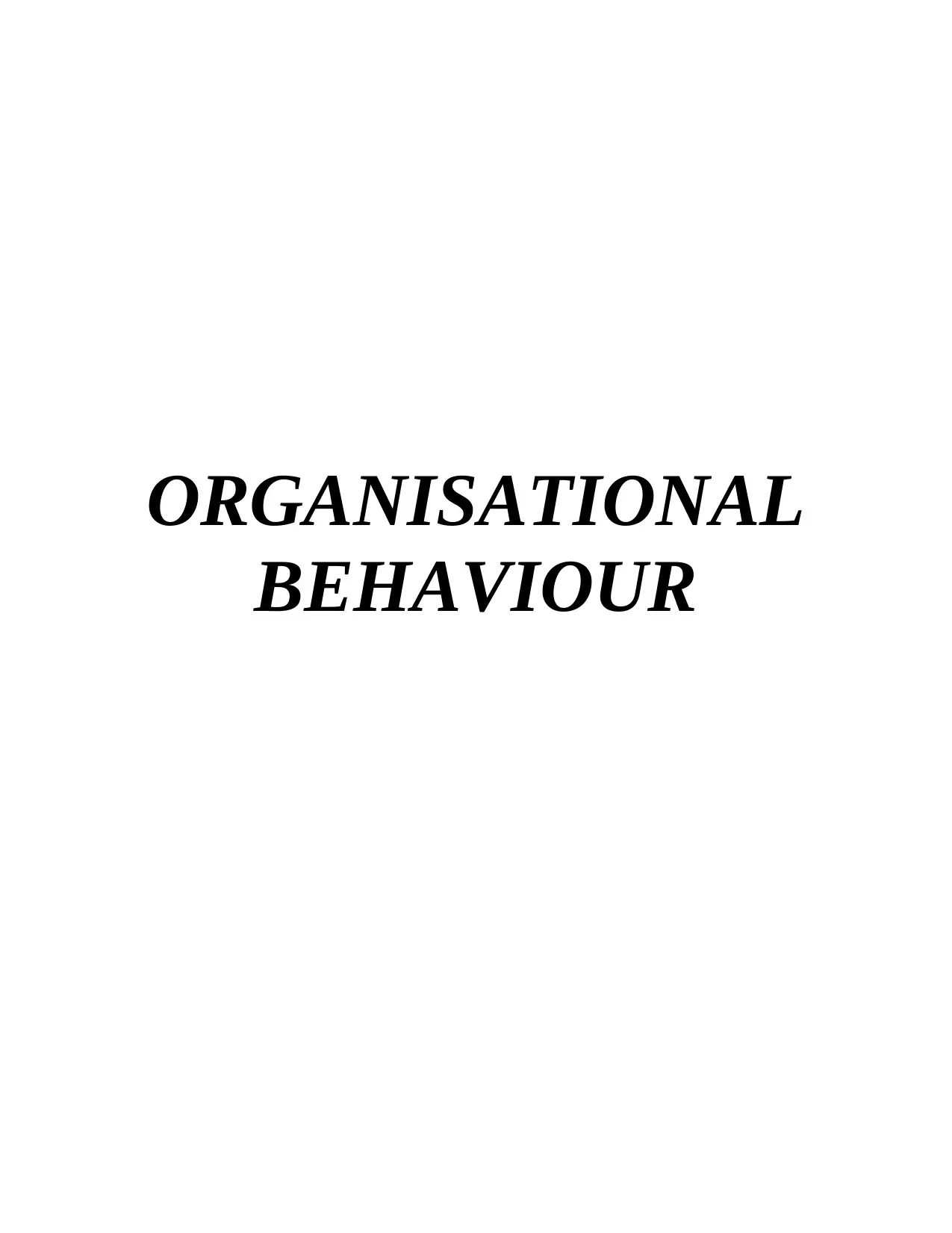
ORGANISATIONAL
BEHAVIOUR
BEHAVIOUR
Paraphrase This Document
Need a fresh take? Get an instant paraphrase of this document with our AI Paraphraser
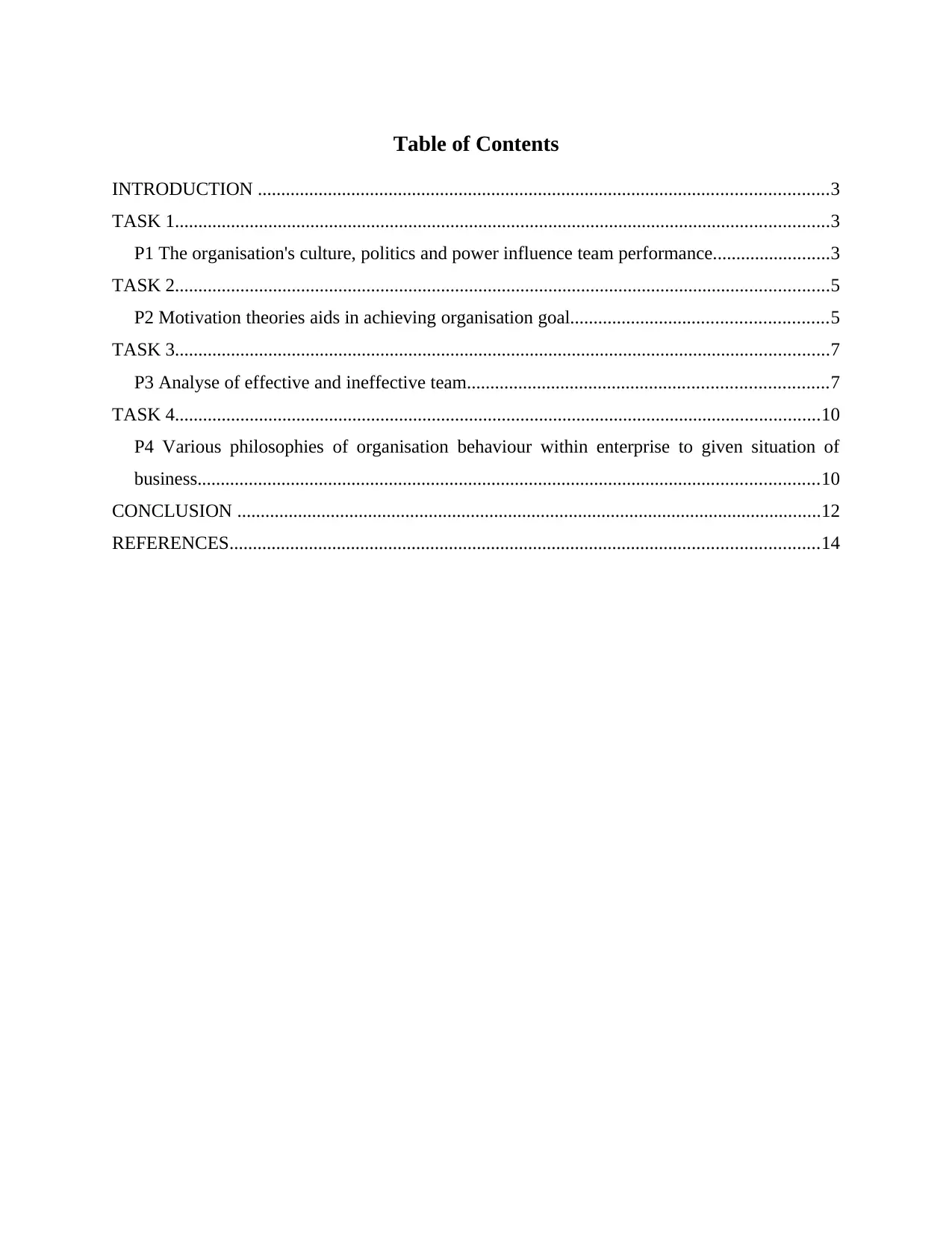
Table of Contents
INTRODUCTION ..........................................................................................................................3
TASK 1............................................................................................................................................3
P1 The organisation's culture, politics and power influence team performance.........................3
TASK 2............................................................................................................................................5
P2 Motivation theories aids in achieving organisation goal.......................................................5
TASK 3............................................................................................................................................7
P3 Analyse of effective and ineffective team.............................................................................7
TASK 4..........................................................................................................................................10
P4 Various philosophies of organisation behaviour within enterprise to given situation of
business.....................................................................................................................................10
CONCLUSION .............................................................................................................................12
REFERENCES..............................................................................................................................14
INTRODUCTION ..........................................................................................................................3
TASK 1............................................................................................................................................3
P1 The organisation's culture, politics and power influence team performance.........................3
TASK 2............................................................................................................................................5
P2 Motivation theories aids in achieving organisation goal.......................................................5
TASK 3............................................................................................................................................7
P3 Analyse of effective and ineffective team.............................................................................7
TASK 4..........................................................................................................................................10
P4 Various philosophies of organisation behaviour within enterprise to given situation of
business.....................................................................................................................................10
CONCLUSION .............................................................................................................................12
REFERENCES..............................................................................................................................14
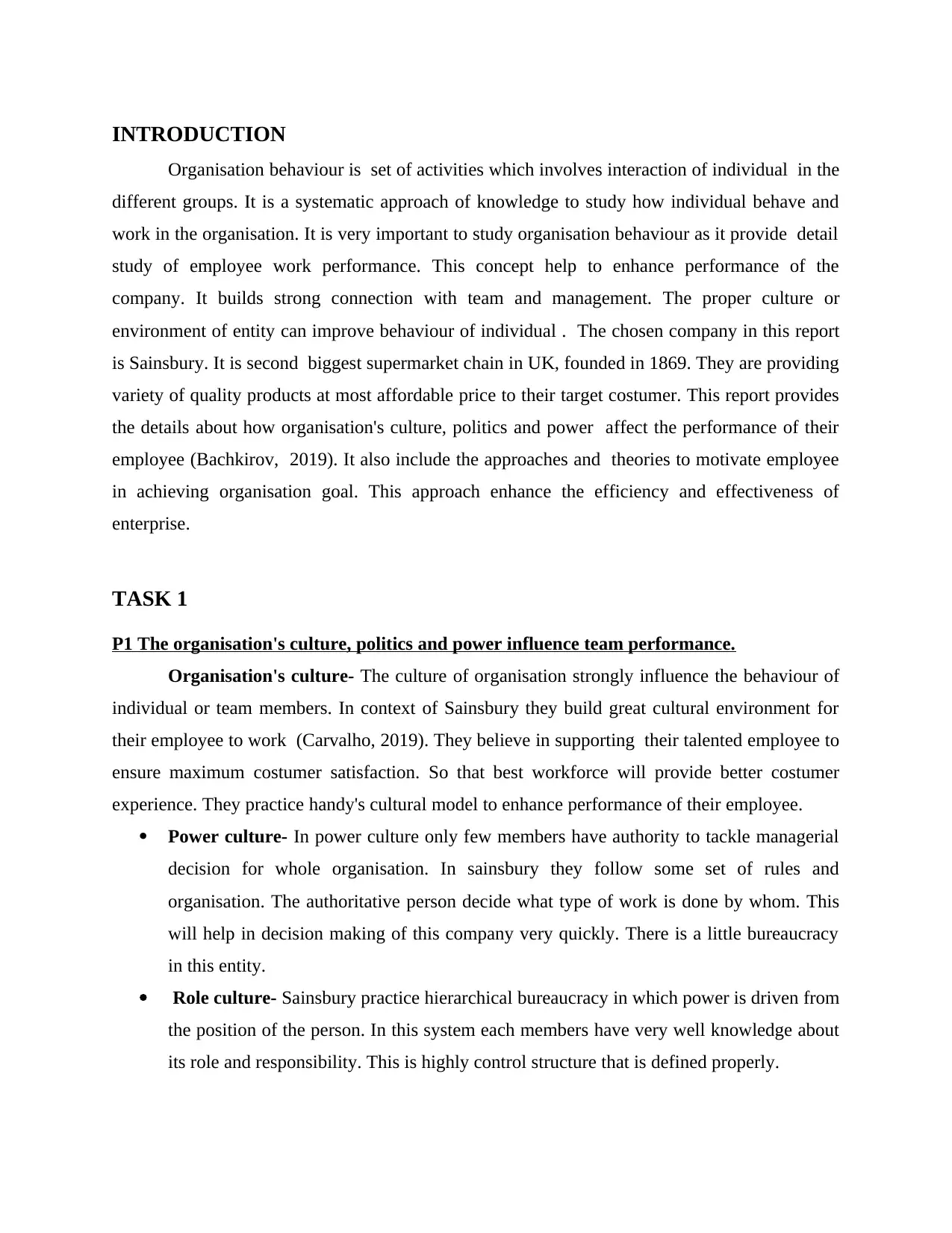
INTRODUCTION
Organisation behaviour is set of activities which involves interaction of individual in the
different groups. It is a systematic approach of knowledge to study how individual behave and
work in the organisation. It is very important to study organisation behaviour as it provide detail
study of employee work performance. This concept help to enhance performance of the
company. It builds strong connection with team and management. The proper culture or
environment of entity can improve behaviour of individual . The chosen company in this report
is Sainsbury. It is second biggest supermarket chain in UK, founded in 1869. They are providing
variety of quality products at most affordable price to their target costumer. This report provides
the details about how organisation's culture, politics and power affect the performance of their
employee (Bachkirov, 2019). It also include the approaches and theories to motivate employee
in achieving organisation goal. This approach enhance the efficiency and effectiveness of
enterprise.
TASK 1
P1 The organisation's culture, politics and power influence team performance.
Organisation's culture- The culture of organisation strongly influence the behaviour of
individual or team members. In context of Sainsbury they build great cultural environment for
their employee to work (Carvalho, 2019). They believe in supporting their talented employee to
ensure maximum costumer satisfaction. So that best workforce will provide better costumer
experience. They practice handy's cultural model to enhance performance of their employee.
Power culture- In power culture only few members have authority to tackle managerial
decision for whole organisation. In sainsbury they follow some set of rules and
organisation. The authoritative person decide what type of work is done by whom. This
will help in decision making of this company very quickly. There is a little bureaucracy
in this entity.
Role culture- Sainsbury practice hierarchical bureaucracy in which power is driven from
the position of the person. In this system each members have very well knowledge about
its role and responsibility. This is highly control structure that is defined properly.
Organisation behaviour is set of activities which involves interaction of individual in the
different groups. It is a systematic approach of knowledge to study how individual behave and
work in the organisation. It is very important to study organisation behaviour as it provide detail
study of employee work performance. This concept help to enhance performance of the
company. It builds strong connection with team and management. The proper culture or
environment of entity can improve behaviour of individual . The chosen company in this report
is Sainsbury. It is second biggest supermarket chain in UK, founded in 1869. They are providing
variety of quality products at most affordable price to their target costumer. This report provides
the details about how organisation's culture, politics and power affect the performance of their
employee (Bachkirov, 2019). It also include the approaches and theories to motivate employee
in achieving organisation goal. This approach enhance the efficiency and effectiveness of
enterprise.
TASK 1
P1 The organisation's culture, politics and power influence team performance.
Organisation's culture- The culture of organisation strongly influence the behaviour of
individual or team members. In context of Sainsbury they build great cultural environment for
their employee to work (Carvalho, 2019). They believe in supporting their talented employee to
ensure maximum costumer satisfaction. So that best workforce will provide better costumer
experience. They practice handy's cultural model to enhance performance of their employee.
Power culture- In power culture only few members have authority to tackle managerial
decision for whole organisation. In sainsbury they follow some set of rules and
organisation. The authoritative person decide what type of work is done by whom. This
will help in decision making of this company very quickly. There is a little bureaucracy
in this entity.
Role culture- Sainsbury practice hierarchical bureaucracy in which power is driven from
the position of the person. In this system each members have very well knowledge about
its role and responsibility. This is highly control structure that is defined properly.
⊘ This is a preview!⊘
Do you want full access?
Subscribe today to unlock all pages.

Trusted by 1+ million students worldwide
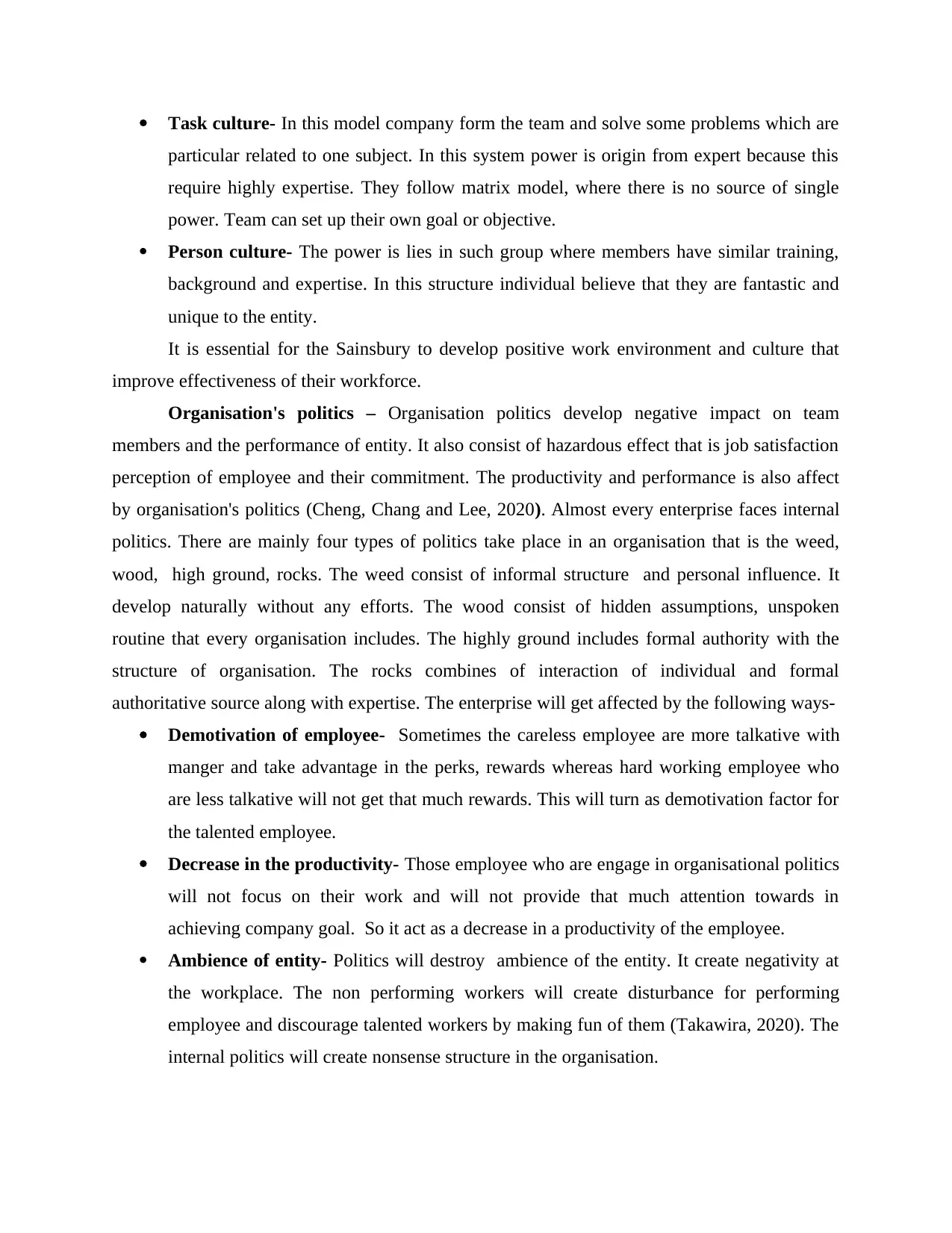
Task culture- In this model company form the team and solve some problems which are
particular related to one subject. In this system power is origin from expert because this
require highly expertise. They follow matrix model, where there is no source of single
power. Team can set up their own goal or objective.
Person culture- The power is lies in such group where members have similar training,
background and expertise. In this structure individual believe that they are fantastic and
unique to the entity.
It is essential for the Sainsbury to develop positive work environment and culture that
improve effectiveness of their workforce.
Organisation's politics – Organisation politics develop negative impact on team
members and the performance of entity. It also consist of hazardous effect that is job satisfaction
perception of employee and their commitment. The productivity and performance is also affect
by organisation's politics (Cheng, Chang and Lee, 2020). Almost every enterprise faces internal
politics. There are mainly four types of politics take place in an organisation that is the weed,
wood, high ground, rocks. The weed consist of informal structure and personal influence. It
develop naturally without any efforts. The wood consist of hidden assumptions, unspoken
routine that every organisation includes. The highly ground includes formal authority with the
structure of organisation. The rocks combines of interaction of individual and formal
authoritative source along with expertise. The enterprise will get affected by the following ways-
Demotivation of employee- Sometimes the careless employee are more talkative with
manger and take advantage in the perks, rewards whereas hard working employee who
are less talkative will not get that much rewards. This will turn as demotivation factor for
the talented employee.
Decrease in the productivity- Those employee who are engage in organisational politics
will not focus on their work and will not provide that much attention towards in
achieving company goal. So it act as a decrease in a productivity of the employee.
Ambience of entity- Politics will destroy ambience of the entity. It create negativity at
the workplace. The non performing workers will create disturbance for performing
employee and discourage talented workers by making fun of them (Takawira, 2020). The
internal politics will create nonsense structure in the organisation.
particular related to one subject. In this system power is origin from expert because this
require highly expertise. They follow matrix model, where there is no source of single
power. Team can set up their own goal or objective.
Person culture- The power is lies in such group where members have similar training,
background and expertise. In this structure individual believe that they are fantastic and
unique to the entity.
It is essential for the Sainsbury to develop positive work environment and culture that
improve effectiveness of their workforce.
Organisation's politics – Organisation politics develop negative impact on team
members and the performance of entity. It also consist of hazardous effect that is job satisfaction
perception of employee and their commitment. The productivity and performance is also affect
by organisation's politics (Cheng, Chang and Lee, 2020). Almost every enterprise faces internal
politics. There are mainly four types of politics take place in an organisation that is the weed,
wood, high ground, rocks. The weed consist of informal structure and personal influence. It
develop naturally without any efforts. The wood consist of hidden assumptions, unspoken
routine that every organisation includes. The highly ground includes formal authority with the
structure of organisation. The rocks combines of interaction of individual and formal
authoritative source along with expertise. The enterprise will get affected by the following ways-
Demotivation of employee- Sometimes the careless employee are more talkative with
manger and take advantage in the perks, rewards whereas hard working employee who
are less talkative will not get that much rewards. This will turn as demotivation factor for
the talented employee.
Decrease in the productivity- Those employee who are engage in organisational politics
will not focus on their work and will not provide that much attention towards in
achieving company goal. So it act as a decrease in a productivity of the employee.
Ambience of entity- Politics will destroy ambience of the entity. It create negativity at
the workplace. The non performing workers will create disturbance for performing
employee and discourage talented workers by making fun of them (Takawira, 2020). The
internal politics will create nonsense structure in the organisation.
Paraphrase This Document
Need a fresh take? Get an instant paraphrase of this document with our AI Paraphraser
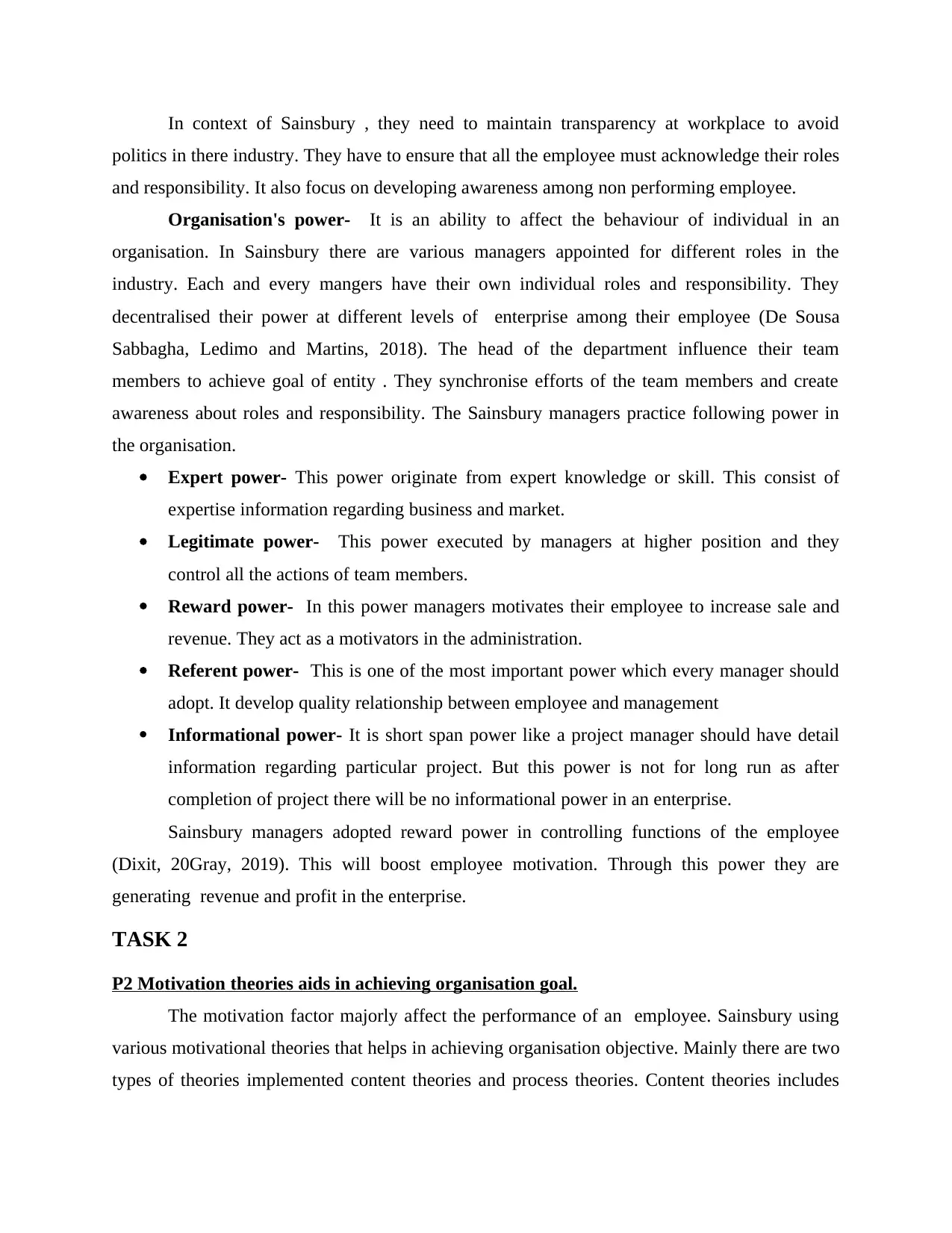
In context of Sainsbury , they need to maintain transparency at workplace to avoid
politics in there industry. They have to ensure that all the employee must acknowledge their roles
and responsibility. It also focus on developing awareness among non performing employee.
Organisation's power- It is an ability to affect the behaviour of individual in an
organisation. In Sainsbury there are various managers appointed for different roles in the
industry. Each and every mangers have their own individual roles and responsibility. They
decentralised their power at different levels of enterprise among their employee (De Sousa
Sabbagha, Ledimo and Martins, 2018). The head of the department influence their team
members to achieve goal of entity . They synchronise efforts of the team members and create
awareness about roles and responsibility. The Sainsbury managers practice following power in
the organisation.
Expert power- This power originate from expert knowledge or skill. This consist of
expertise information regarding business and market.
Legitimate power- This power executed by managers at higher position and they
control all the actions of team members.
Reward power- In this power managers motivates their employee to increase sale and
revenue. They act as a motivators in the administration.
Referent power- This is one of the most important power which every manager should
adopt. It develop quality relationship between employee and management
Informational power- It is short span power like a project manager should have detail
information regarding particular project. But this power is not for long run as after
completion of project there will be no informational power in an enterprise.
Sainsbury managers adopted reward power in controlling functions of the employee
(Dixit, 20Gray, 2019). This will boost employee motivation. Through this power they are
generating revenue and profit in the enterprise.
TASK 2
P2 Motivation theories aids in achieving organisation goal.
The motivation factor majorly affect the performance of an employee. Sainsbury using
various motivational theories that helps in achieving organisation objective. Mainly there are two
types of theories implemented content theories and process theories. Content theories includes
politics in there industry. They have to ensure that all the employee must acknowledge their roles
and responsibility. It also focus on developing awareness among non performing employee.
Organisation's power- It is an ability to affect the behaviour of individual in an
organisation. In Sainsbury there are various managers appointed for different roles in the
industry. Each and every mangers have their own individual roles and responsibility. They
decentralised their power at different levels of enterprise among their employee (De Sousa
Sabbagha, Ledimo and Martins, 2018). The head of the department influence their team
members to achieve goal of entity . They synchronise efforts of the team members and create
awareness about roles and responsibility. The Sainsbury managers practice following power in
the organisation.
Expert power- This power originate from expert knowledge or skill. This consist of
expertise information regarding business and market.
Legitimate power- This power executed by managers at higher position and they
control all the actions of team members.
Reward power- In this power managers motivates their employee to increase sale and
revenue. They act as a motivators in the administration.
Referent power- This is one of the most important power which every manager should
adopt. It develop quality relationship between employee and management
Informational power- It is short span power like a project manager should have detail
information regarding particular project. But this power is not for long run as after
completion of project there will be no informational power in an enterprise.
Sainsbury managers adopted reward power in controlling functions of the employee
(Dixit, 20Gray, 2019). This will boost employee motivation. Through this power they are
generating revenue and profit in the enterprise.
TASK 2
P2 Motivation theories aids in achieving organisation goal.
The motivation factor majorly affect the performance of an employee. Sainsbury using
various motivational theories that helps in achieving organisation objective. Mainly there are two
types of theories implemented content theories and process theories. Content theories includes
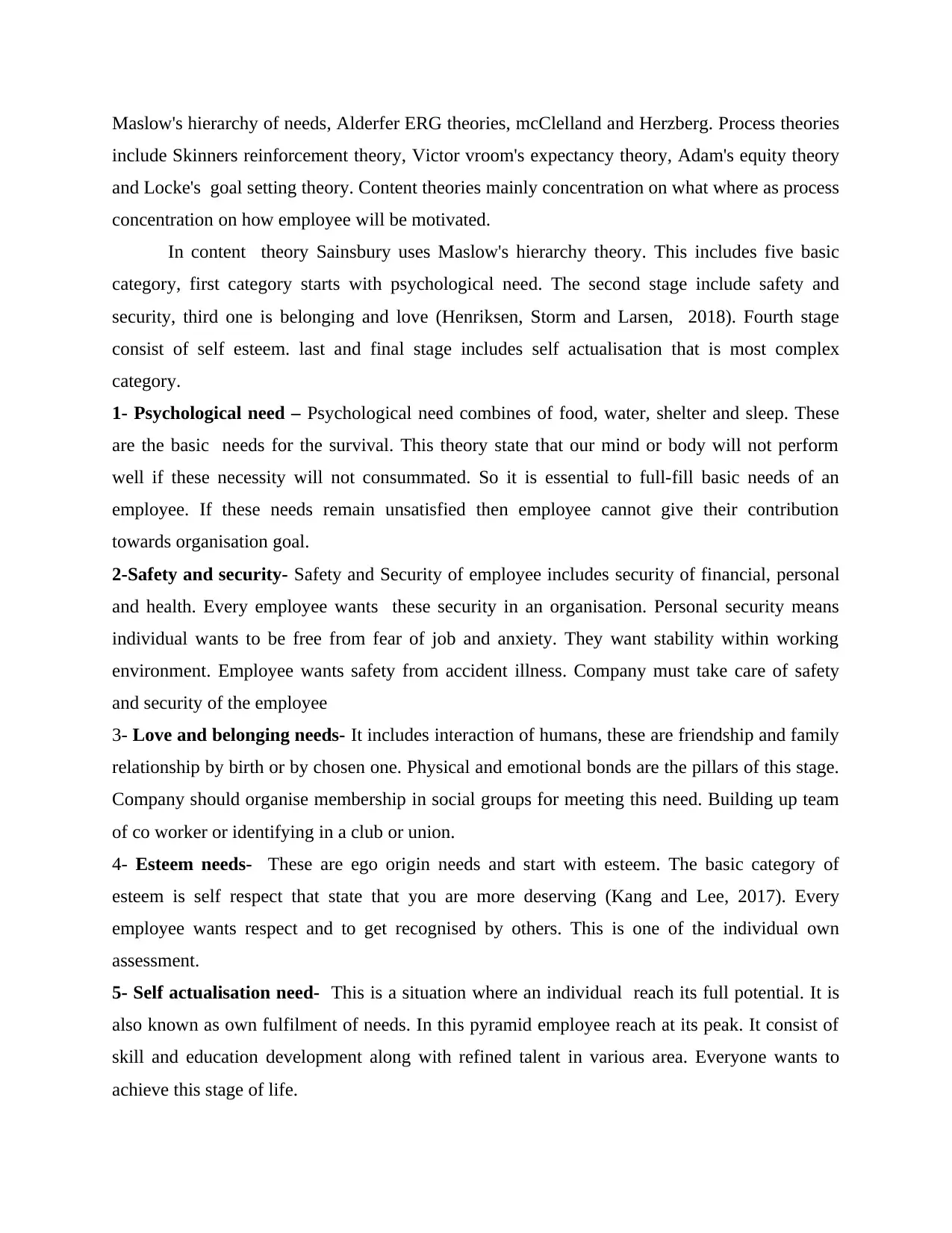
Maslow's hierarchy of needs, Alderfer ERG theories, mcClelland and Herzberg. Process theories
include Skinners reinforcement theory, Victor vroom's expectancy theory, Adam's equity theory
and Locke's goal setting theory. Content theories mainly concentration on what where as process
concentration on how employee will be motivated.
In content theory Sainsbury uses Maslow's hierarchy theory. This includes five basic
category, first category starts with psychological need. The second stage include safety and
security, third one is belonging and love (Henriksen, Storm and Larsen, 2018). Fourth stage
consist of self esteem. last and final stage includes self actualisation that is most complex
category.
1- Psychological need – Psychological need combines of food, water, shelter and sleep. These
are the basic needs for the survival. This theory state that our mind or body will not perform
well if these necessity will not consummated. So it is essential to full-fill basic needs of an
employee. If these needs remain unsatisfied then employee cannot give their contribution
towards organisation goal.
2-Safety and security- Safety and Security of employee includes security of financial, personal
and health. Every employee wants these security in an organisation. Personal security means
individual wants to be free from fear of job and anxiety. They want stability within working
environment. Employee wants safety from accident illness. Company must take care of safety
and security of the employee
3- Love and belonging needs- It includes interaction of humans, these are friendship and family
relationship by birth or by chosen one. Physical and emotional bonds are the pillars of this stage.
Company should organise membership in social groups for meeting this need. Building up team
of co worker or identifying in a club or union.
4- Esteem needs- These are ego origin needs and start with esteem. The basic category of
esteem is self respect that state that you are more deserving (Kang and Lee, 2017). Every
employee wants respect and to get recognised by others. This is one of the individual own
assessment.
5- Self actualisation need- This is a situation where an individual reach its full potential. It is
also known as own fulfilment of needs. In this pyramid employee reach at its peak. It consist of
skill and education development along with refined talent in various area. Everyone wants to
achieve this stage of life.
include Skinners reinforcement theory, Victor vroom's expectancy theory, Adam's equity theory
and Locke's goal setting theory. Content theories mainly concentration on what where as process
concentration on how employee will be motivated.
In content theory Sainsbury uses Maslow's hierarchy theory. This includes five basic
category, first category starts with psychological need. The second stage include safety and
security, third one is belonging and love (Henriksen, Storm and Larsen, 2018). Fourth stage
consist of self esteem. last and final stage includes self actualisation that is most complex
category.
1- Psychological need – Psychological need combines of food, water, shelter and sleep. These
are the basic needs for the survival. This theory state that our mind or body will not perform
well if these necessity will not consummated. So it is essential to full-fill basic needs of an
employee. If these needs remain unsatisfied then employee cannot give their contribution
towards organisation goal.
2-Safety and security- Safety and Security of employee includes security of financial, personal
and health. Every employee wants these security in an organisation. Personal security means
individual wants to be free from fear of job and anxiety. They want stability within working
environment. Employee wants safety from accident illness. Company must take care of safety
and security of the employee
3- Love and belonging needs- It includes interaction of humans, these are friendship and family
relationship by birth or by chosen one. Physical and emotional bonds are the pillars of this stage.
Company should organise membership in social groups for meeting this need. Building up team
of co worker or identifying in a club or union.
4- Esteem needs- These are ego origin needs and start with esteem. The basic category of
esteem is self respect that state that you are more deserving (Kang and Lee, 2017). Every
employee wants respect and to get recognised by others. This is one of the individual own
assessment.
5- Self actualisation need- This is a situation where an individual reach its full potential. It is
also known as own fulfilment of needs. In this pyramid employee reach at its peak. It consist of
skill and education development along with refined talent in various area. Everyone wants to
achieve this stage of life.
⊘ This is a preview!⊘
Do you want full access?
Subscribe today to unlock all pages.

Trusted by 1+ million students worldwide
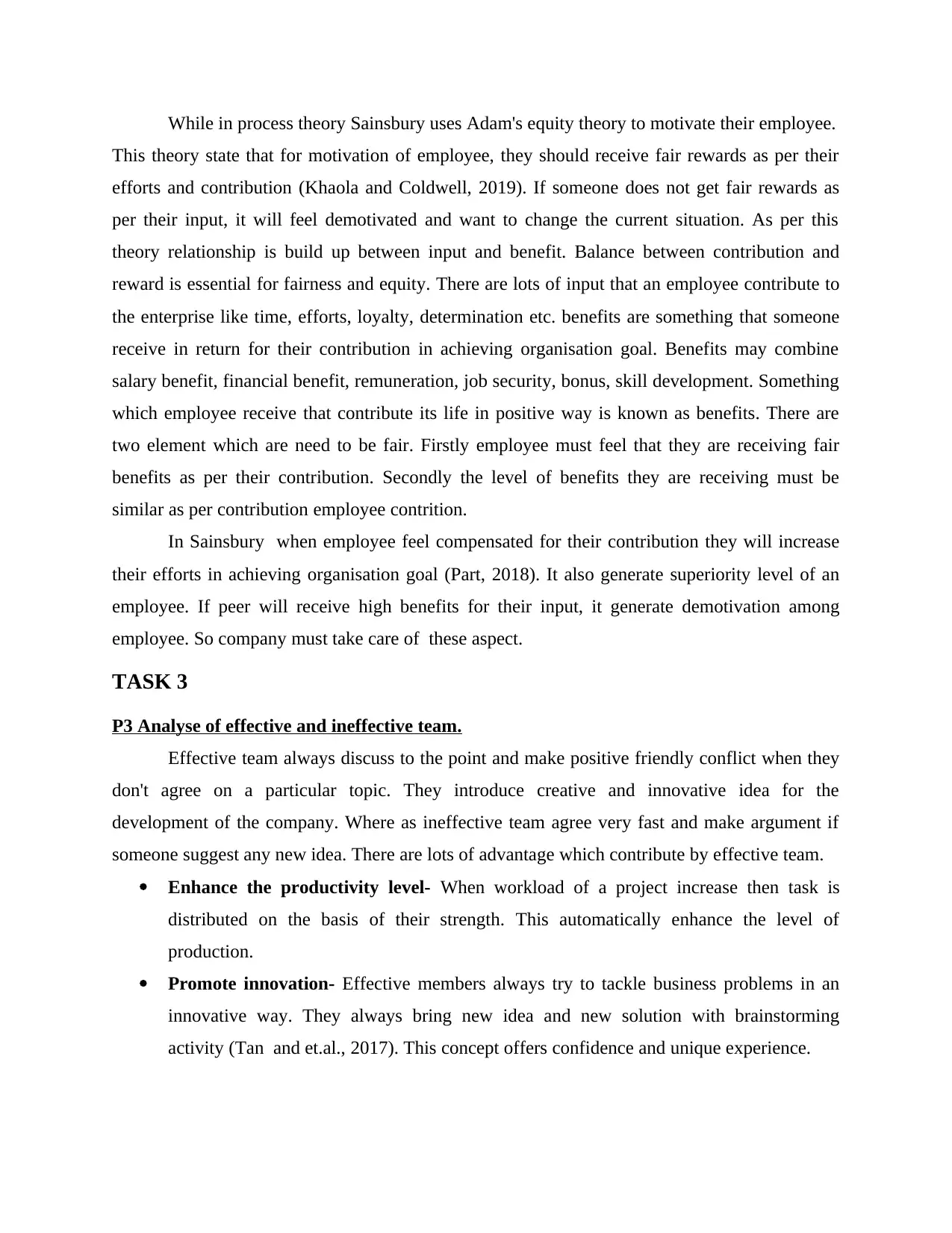
While in process theory Sainsbury uses Adam's equity theory to motivate their employee.
This theory state that for motivation of employee, they should receive fair rewards as per their
efforts and contribution (Khaola and Coldwell, 2019). If someone does not get fair rewards as
per their input, it will feel demotivated and want to change the current situation. As per this
theory relationship is build up between input and benefit. Balance between contribution and
reward is essential for fairness and equity. There are lots of input that an employee contribute to
the enterprise like time, efforts, loyalty, determination etc. benefits are something that someone
receive in return for their contribution in achieving organisation goal. Benefits may combine
salary benefit, financial benefit, remuneration, job security, bonus, skill development. Something
which employee receive that contribute its life in positive way is known as benefits. There are
two element which are need to be fair. Firstly employee must feel that they are receiving fair
benefits as per their contribution. Secondly the level of benefits they are receiving must be
similar as per contribution employee contrition.
In Sainsbury when employee feel compensated for their contribution they will increase
their efforts in achieving organisation goal (Part, 2018). It also generate superiority level of an
employee. If peer will receive high benefits for their input, it generate demotivation among
employee. So company must take care of these aspect.
TASK 3
P3 Analyse of effective and ineffective team.
Effective team always discuss to the point and make positive friendly conflict when they
don't agree on a particular topic. They introduce creative and innovative idea for the
development of the company. Where as ineffective team agree very fast and make argument if
someone suggest any new idea. There are lots of advantage which contribute by effective team.
Enhance the productivity level- When workload of a project increase then task is
distributed on the basis of their strength. This automatically enhance the level of
production.
Promote innovation- Effective members always try to tackle business problems in an
innovative way. They always bring new idea and new solution with brainstorming
activity (Tan and et.al., 2017). This concept offers confidence and unique experience.
This theory state that for motivation of employee, they should receive fair rewards as per their
efforts and contribution (Khaola and Coldwell, 2019). If someone does not get fair rewards as
per their input, it will feel demotivated and want to change the current situation. As per this
theory relationship is build up between input and benefit. Balance between contribution and
reward is essential for fairness and equity. There are lots of input that an employee contribute to
the enterprise like time, efforts, loyalty, determination etc. benefits are something that someone
receive in return for their contribution in achieving organisation goal. Benefits may combine
salary benefit, financial benefit, remuneration, job security, bonus, skill development. Something
which employee receive that contribute its life in positive way is known as benefits. There are
two element which are need to be fair. Firstly employee must feel that they are receiving fair
benefits as per their contribution. Secondly the level of benefits they are receiving must be
similar as per contribution employee contrition.
In Sainsbury when employee feel compensated for their contribution they will increase
their efforts in achieving organisation goal (Part, 2018). It also generate superiority level of an
employee. If peer will receive high benefits for their input, it generate demotivation among
employee. So company must take care of these aspect.
TASK 3
P3 Analyse of effective and ineffective team.
Effective team always discuss to the point and make positive friendly conflict when they
don't agree on a particular topic. They introduce creative and innovative idea for the
development of the company. Where as ineffective team agree very fast and make argument if
someone suggest any new idea. There are lots of advantage which contribute by effective team.
Enhance the productivity level- When workload of a project increase then task is
distributed on the basis of their strength. This automatically enhance the level of
production.
Promote innovation- Effective members always try to tackle business problems in an
innovative way. They always bring new idea and new solution with brainstorming
activity (Tan and et.al., 2017). This concept offers confidence and unique experience.
Paraphrase This Document
Need a fresh take? Get an instant paraphrase of this document with our AI Paraphraser
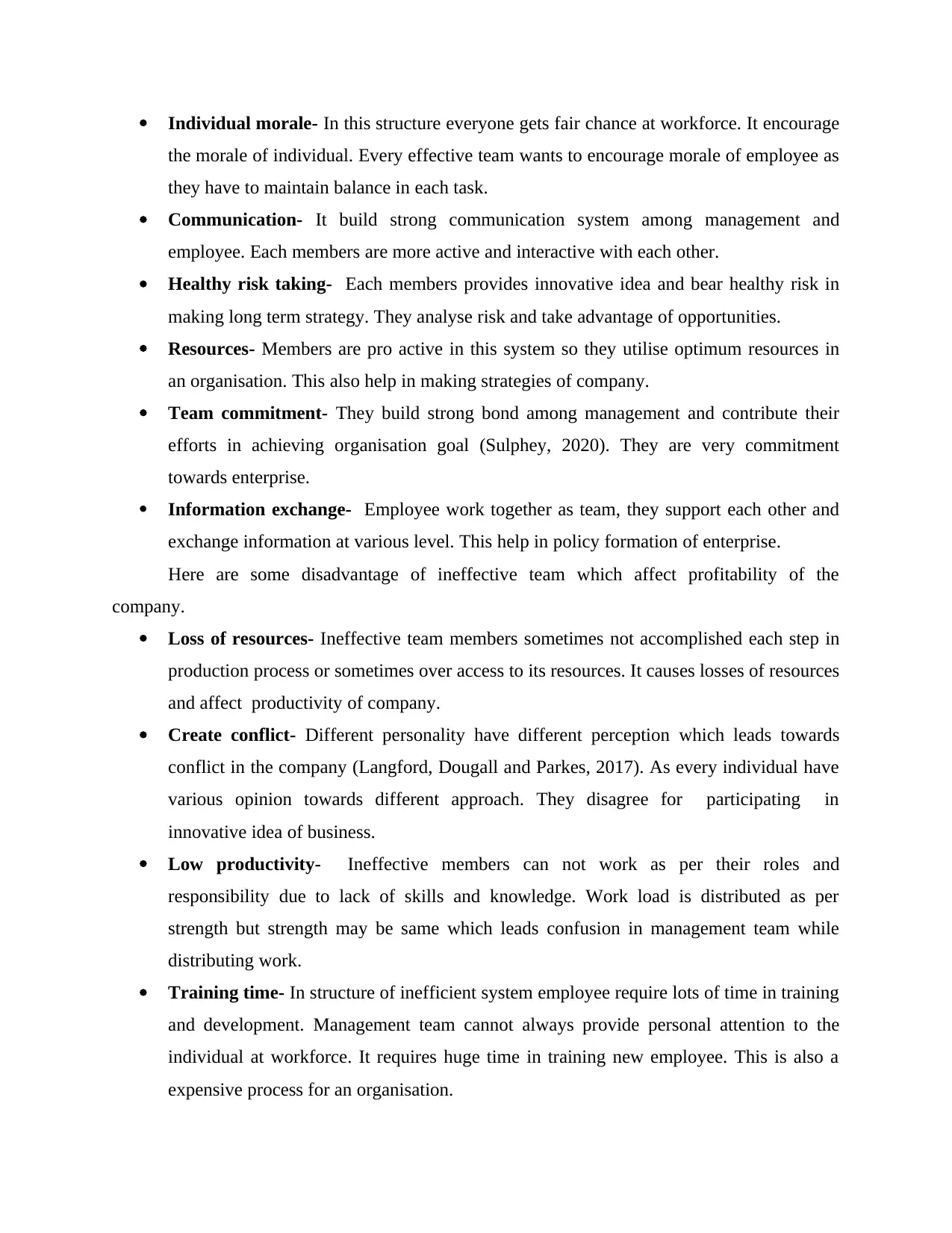
Individual morale- In this structure everyone gets fair chance at workforce. It encourage
the morale of individual. Every effective team wants to encourage morale of employee as
they have to maintain balance in each task.
Communication- It build strong communication system among management and
employee. Each members are more active and interactive with each other.
Healthy risk taking- Each members provides innovative idea and bear healthy risk in
making long term strategy. They analyse risk and take advantage of opportunities.
Resources- Members are pro active in this system so they utilise optimum resources in
an organisation. This also help in making strategies of company.
Team commitment- They build strong bond among management and contribute their
efforts in achieving organisation goal (Sulphey, 2020). They are very commitment
towards enterprise.
Information exchange- Employee work together as team, they support each other and
exchange information at various level. This help in policy formation of enterprise.
Here are some disadvantage of ineffective team which affect profitability of the
company.
Loss of resources- Ineffective team members sometimes not accomplished each step in
production process or sometimes over access to its resources. It causes losses of resources
and affect productivity of company.
Create conflict- Different personality have different perception which leads towards
conflict in the company (Langford, Dougall and Parkes, 2017). As every individual have
various opinion towards different approach. They disagree for participating in
innovative idea of business.
Low productivity- Ineffective members can not work as per their roles and
responsibility due to lack of skills and knowledge. Work load is distributed as per
strength but strength may be same which leads confusion in management team while
distributing work.
Training time- In structure of inefficient system employee require lots of time in training
and development. Management team cannot always provide personal attention to the
individual at workforce. It requires huge time in training new employee. This is also a
expensive process for an organisation.
the morale of individual. Every effective team wants to encourage morale of employee as
they have to maintain balance in each task.
Communication- It build strong communication system among management and
employee. Each members are more active and interactive with each other.
Healthy risk taking- Each members provides innovative idea and bear healthy risk in
making long term strategy. They analyse risk and take advantage of opportunities.
Resources- Members are pro active in this system so they utilise optimum resources in
an organisation. This also help in making strategies of company.
Team commitment- They build strong bond among management and contribute their
efforts in achieving organisation goal (Sulphey, 2020). They are very commitment
towards enterprise.
Information exchange- Employee work together as team, they support each other and
exchange information at various level. This help in policy formation of enterprise.
Here are some disadvantage of ineffective team which affect profitability of the
company.
Loss of resources- Ineffective team members sometimes not accomplished each step in
production process or sometimes over access to its resources. It causes losses of resources
and affect productivity of company.
Create conflict- Different personality have different perception which leads towards
conflict in the company (Langford, Dougall and Parkes, 2017). As every individual have
various opinion towards different approach. They disagree for participating in
innovative idea of business.
Low productivity- Ineffective members can not work as per their roles and
responsibility due to lack of skills and knowledge. Work load is distributed as per
strength but strength may be same which leads confusion in management team while
distributing work.
Training time- In structure of inefficient system employee require lots of time in training
and development. Management team cannot always provide personal attention to the
individual at workforce. It requires huge time in training new employee. This is also a
expensive process for an organisation.
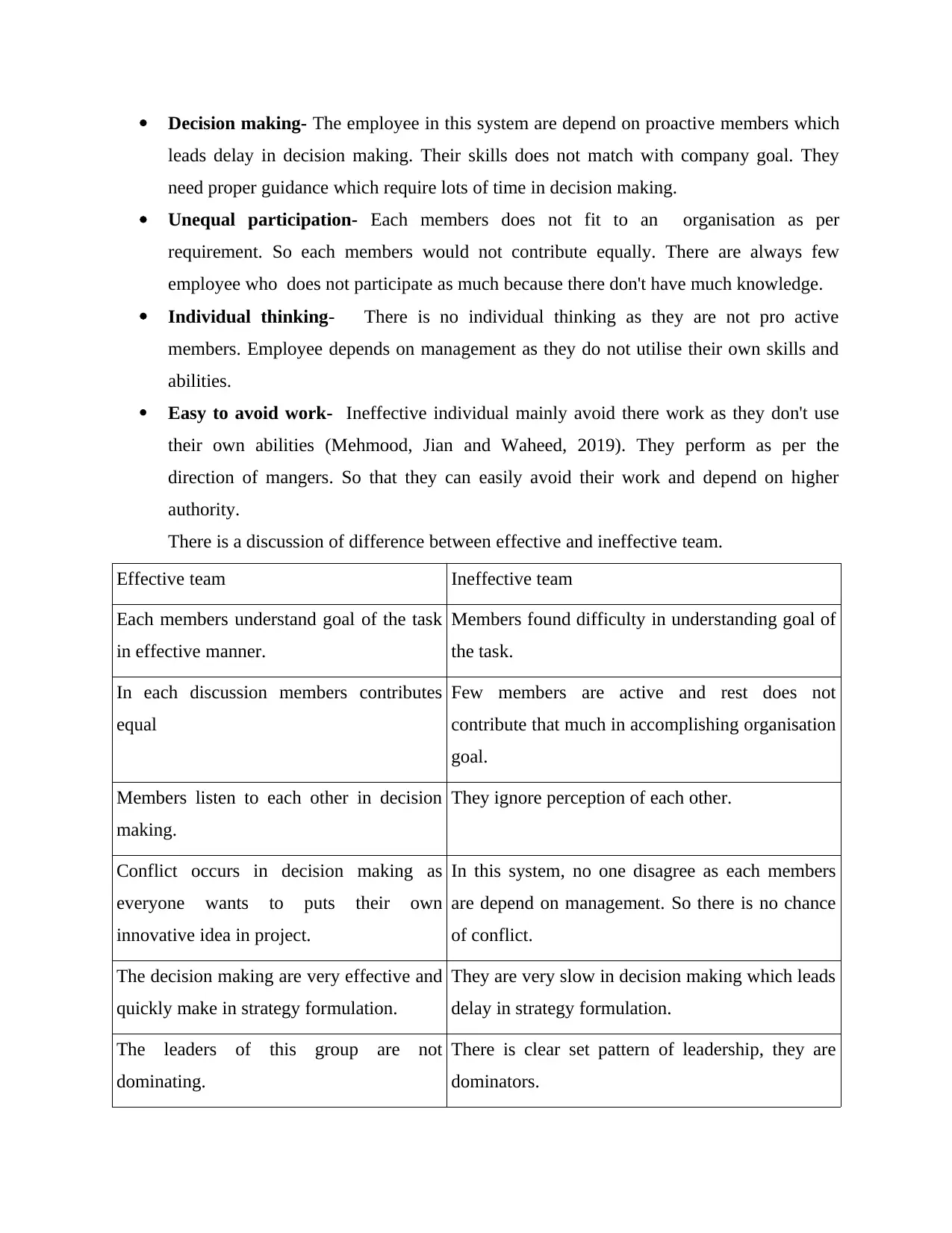
Decision making- The employee in this system are depend on proactive members which
leads delay in decision making. Their skills does not match with company goal. They
need proper guidance which require lots of time in decision making.
Unequal participation- Each members does not fit to an organisation as per
requirement. So each members would not contribute equally. There are always few
employee who does not participate as much because there don't have much knowledge.
Individual thinking- There is no individual thinking as they are not pro active
members. Employee depends on management as they do not utilise their own skills and
abilities.
Easy to avoid work- Ineffective individual mainly avoid there work as they don't use
their own abilities (Mehmood, Jian and Waheed, 2019). They perform as per the
direction of mangers. So that they can easily avoid their work and depend on higher
authority.
There is a discussion of difference between effective and ineffective team.
Effective team Ineffective team
Each members understand goal of the task
in effective manner.
Members found difficulty in understanding goal of
the task.
In each discussion members contributes
equal
Few members are active and rest does not
contribute that much in accomplishing organisation
goal.
Members listen to each other in decision
making.
They ignore perception of each other.
Conflict occurs in decision making as
everyone wants to puts their own
innovative idea in project.
In this system, no one disagree as each members
are depend on management. So there is no chance
of conflict.
The decision making are very effective and
quickly make in strategy formulation.
They are very slow in decision making which leads
delay in strategy formulation.
The leaders of this group are not
dominating.
There is clear set pattern of leadership, they are
dominators.
leads delay in decision making. Their skills does not match with company goal. They
need proper guidance which require lots of time in decision making.
Unequal participation- Each members does not fit to an organisation as per
requirement. So each members would not contribute equally. There are always few
employee who does not participate as much because there don't have much knowledge.
Individual thinking- There is no individual thinking as they are not pro active
members. Employee depends on management as they do not utilise their own skills and
abilities.
Easy to avoid work- Ineffective individual mainly avoid there work as they don't use
their own abilities (Mehmood, Jian and Waheed, 2019). They perform as per the
direction of mangers. So that they can easily avoid their work and depend on higher
authority.
There is a discussion of difference between effective and ineffective team.
Effective team Ineffective team
Each members understand goal of the task
in effective manner.
Members found difficulty in understanding goal of
the task.
In each discussion members contributes
equal
Few members are active and rest does not
contribute that much in accomplishing organisation
goal.
Members listen to each other in decision
making.
They ignore perception of each other.
Conflict occurs in decision making as
everyone wants to puts their own
innovative idea in project.
In this system, no one disagree as each members
are depend on management. So there is no chance
of conflict.
The decision making are very effective and
quickly make in strategy formulation.
They are very slow in decision making which leads
delay in strategy formulation.
The leaders of this group are not
dominating.
There is clear set pattern of leadership, they are
dominators.
⊘ This is a preview!⊘
Do you want full access?
Subscribe today to unlock all pages.

Trusted by 1+ million students worldwide
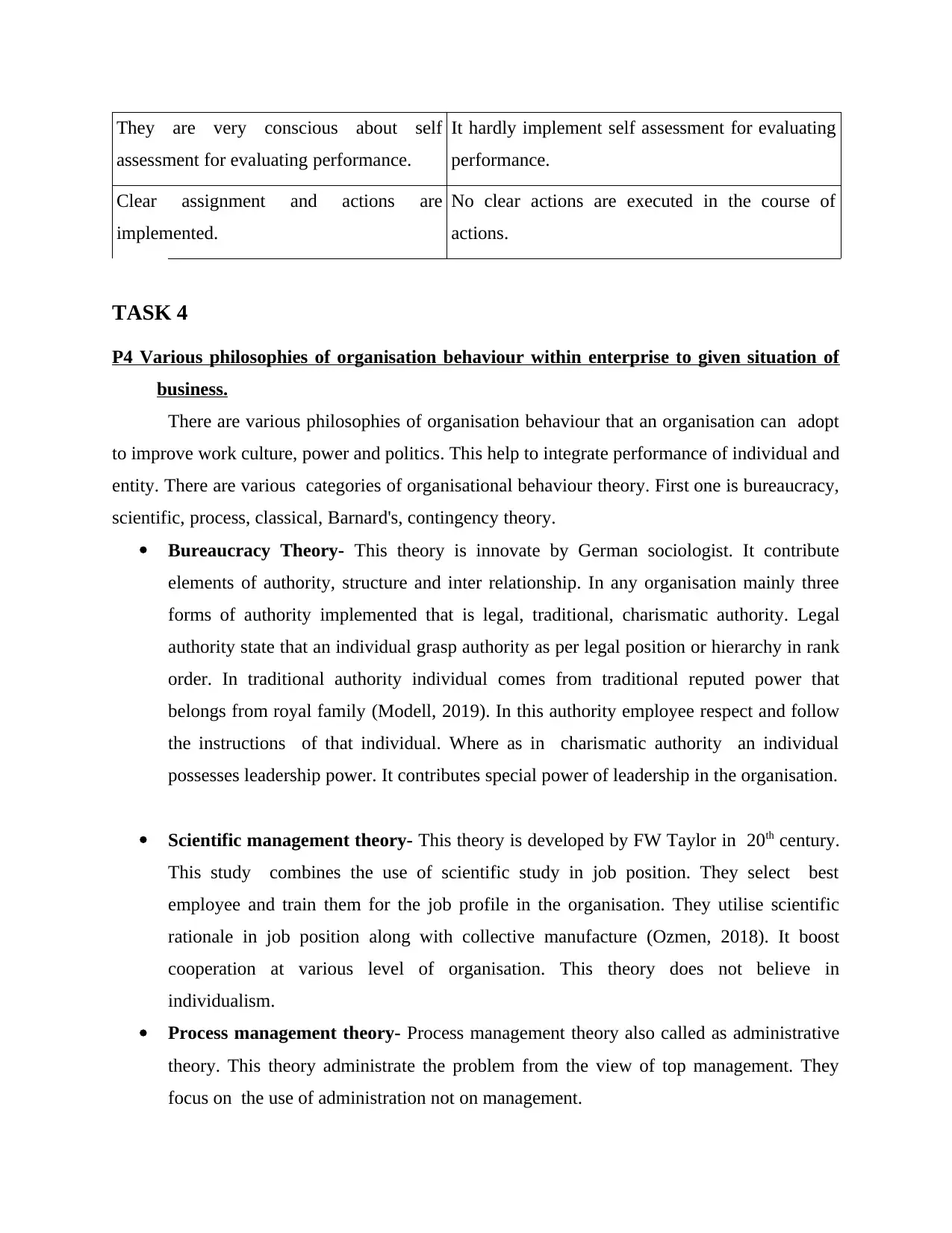
They are very conscious about self
assessment for evaluating performance.
It hardly implement self assessment for evaluating
performance.
Clear assignment and actions are
implemented.
No clear actions are executed in the course of
actions.
TASK 4
P4 Various philosophies of organisation behaviour within enterprise to given situation of
business.
There are various philosophies of organisation behaviour that an organisation can adopt
to improve work culture, power and politics. This help to integrate performance of individual and
entity. There are various categories of organisational behaviour theory. First one is bureaucracy,
scientific, process, classical, Barnard's, contingency theory.
Bureaucracy Theory- This theory is innovate by German sociologist. It contribute
elements of authority, structure and inter relationship. In any organisation mainly three
forms of authority implemented that is legal, traditional, charismatic authority. Legal
authority state that an individual grasp authority as per legal position or hierarchy in rank
order. In traditional authority individual comes from traditional reputed power that
belongs from royal family (Modell, 2019). In this authority employee respect and follow
the instructions of that individual. Where as in charismatic authority an individual
possesses leadership power. It contributes special power of leadership in the organisation.
Scientific management theory- This theory is developed by FW Taylor in 20th century.
This study combines the use of scientific study in job position. They select best
employee and train them for the job profile in the organisation. They utilise scientific
rationale in job position along with collective manufacture (Ozmen, 2018). It boost
cooperation at various level of organisation. This theory does not believe in
individualism.
Process management theory- Process management theory also called as administrative
theory. This theory administrate the problem from the view of top management. They
focus on the use of administration not on management.
assessment for evaluating performance.
It hardly implement self assessment for evaluating
performance.
Clear assignment and actions are
implemented.
No clear actions are executed in the course of
actions.
TASK 4
P4 Various philosophies of organisation behaviour within enterprise to given situation of
business.
There are various philosophies of organisation behaviour that an organisation can adopt
to improve work culture, power and politics. This help to integrate performance of individual and
entity. There are various categories of organisational behaviour theory. First one is bureaucracy,
scientific, process, classical, Barnard's, contingency theory.
Bureaucracy Theory- This theory is innovate by German sociologist. It contribute
elements of authority, structure and inter relationship. In any organisation mainly three
forms of authority implemented that is legal, traditional, charismatic authority. Legal
authority state that an individual grasp authority as per legal position or hierarchy in rank
order. In traditional authority individual comes from traditional reputed power that
belongs from royal family (Modell, 2019). In this authority employee respect and follow
the instructions of that individual. Where as in charismatic authority an individual
possesses leadership power. It contributes special power of leadership in the organisation.
Scientific management theory- This theory is developed by FW Taylor in 20th century.
This study combines the use of scientific study in job position. They select best
employee and train them for the job profile in the organisation. They utilise scientific
rationale in job position along with collective manufacture (Ozmen, 2018). It boost
cooperation at various level of organisation. This theory does not believe in
individualism.
Process management theory- Process management theory also called as administrative
theory. This theory administrate the problem from the view of top management. They
focus on the use of administration not on management.
Paraphrase This Document
Need a fresh take? Get an instant paraphrase of this document with our AI Paraphraser
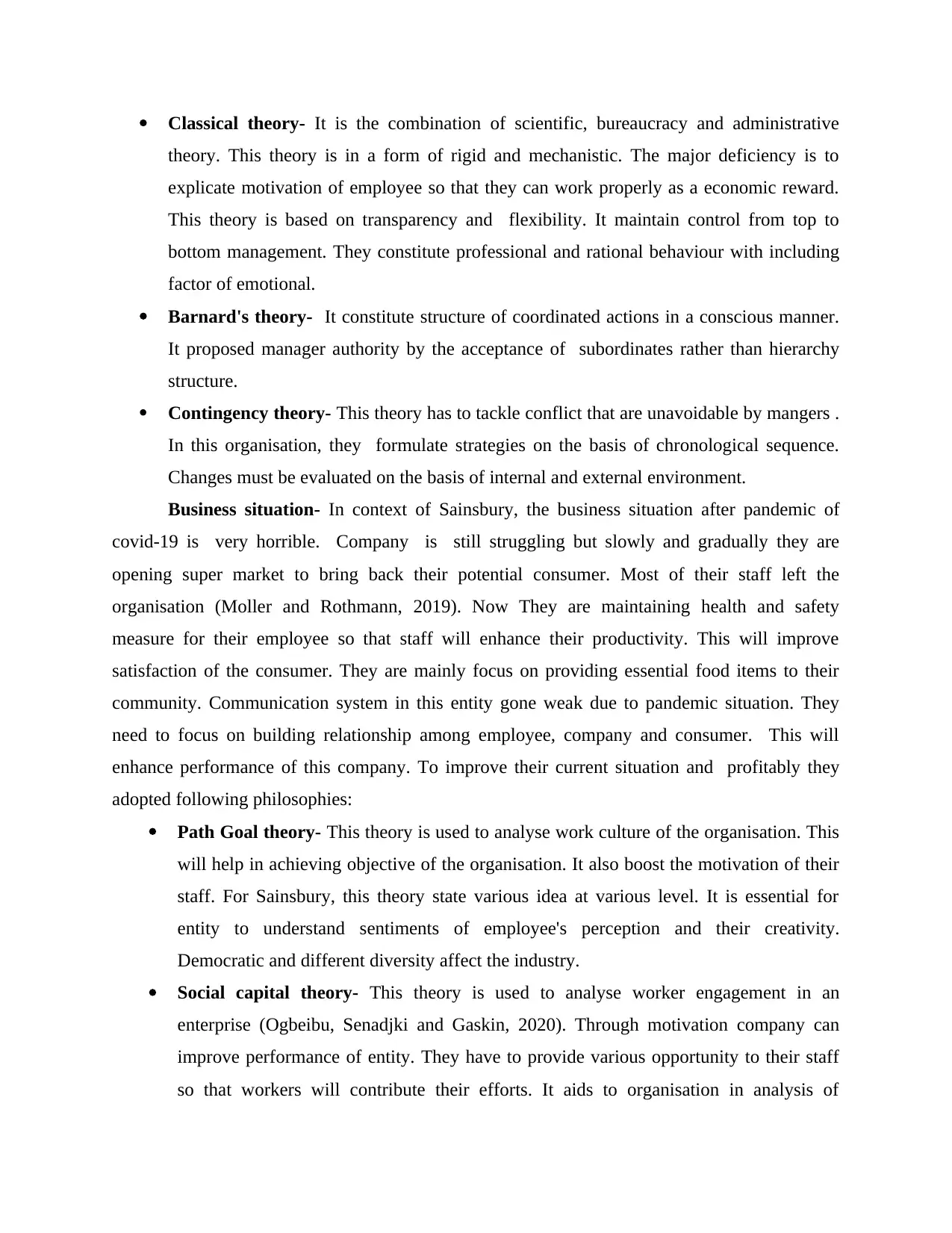
Classical theory- It is the combination of scientific, bureaucracy and administrative
theory. This theory is in a form of rigid and mechanistic. The major deficiency is to
explicate motivation of employee so that they can work properly as a economic reward.
This theory is based on transparency and flexibility. It maintain control from top to
bottom management. They constitute professional and rational behaviour with including
factor of emotional.
Barnard's theory- It constitute structure of coordinated actions in a conscious manner.
It proposed manager authority by the acceptance of subordinates rather than hierarchy
structure.
Contingency theory- This theory has to tackle conflict that are unavoidable by mangers .
In this organisation, they formulate strategies on the basis of chronological sequence.
Changes must be evaluated on the basis of internal and external environment.
Business situation- In context of Sainsbury, the business situation after pandemic of
covid-19 is very horrible. Company is still struggling but slowly and gradually they are
opening super market to bring back their potential consumer. Most of their staff left the
organisation (Moller and Rothmann, 2019). Now They are maintaining health and safety
measure for their employee so that staff will enhance their productivity. This will improve
satisfaction of the consumer. They are mainly focus on providing essential food items to their
community. Communication system in this entity gone weak due to pandemic situation. They
need to focus on building relationship among employee, company and consumer. This will
enhance performance of this company. To improve their current situation and profitably they
adopted following philosophies:
Path Goal theory- This theory is used to analyse work culture of the organisation. This
will help in achieving objective of the organisation. It also boost the motivation of their
staff. For Sainsbury, this theory state various idea at various level. It is essential for
entity to understand sentiments of employee's perception and their creativity.
Democratic and different diversity affect the industry.
Social capital theory- This theory is used to analyse worker engagement in an
enterprise (Ogbeibu, Senadjki and Gaskin, 2020). Through motivation company can
improve performance of entity. They have to provide various opportunity to their staff
so that workers will contribute their efforts. It aids to organisation in analysis of
theory. This theory is in a form of rigid and mechanistic. The major deficiency is to
explicate motivation of employee so that they can work properly as a economic reward.
This theory is based on transparency and flexibility. It maintain control from top to
bottom management. They constitute professional and rational behaviour with including
factor of emotional.
Barnard's theory- It constitute structure of coordinated actions in a conscious manner.
It proposed manager authority by the acceptance of subordinates rather than hierarchy
structure.
Contingency theory- This theory has to tackle conflict that are unavoidable by mangers .
In this organisation, they formulate strategies on the basis of chronological sequence.
Changes must be evaluated on the basis of internal and external environment.
Business situation- In context of Sainsbury, the business situation after pandemic of
covid-19 is very horrible. Company is still struggling but slowly and gradually they are
opening super market to bring back their potential consumer. Most of their staff left the
organisation (Moller and Rothmann, 2019). Now They are maintaining health and safety
measure for their employee so that staff will enhance their productivity. This will improve
satisfaction of the consumer. They are mainly focus on providing essential food items to their
community. Communication system in this entity gone weak due to pandemic situation. They
need to focus on building relationship among employee, company and consumer. This will
enhance performance of this company. To improve their current situation and profitably they
adopted following philosophies:
Path Goal theory- This theory is used to analyse work culture of the organisation. This
will help in achieving objective of the organisation. It also boost the motivation of their
staff. For Sainsbury, this theory state various idea at various level. It is essential for
entity to understand sentiments of employee's perception and their creativity.
Democratic and different diversity affect the industry.
Social capital theory- This theory is used to analyse worker engagement in an
enterprise (Ogbeibu, Senadjki and Gaskin, 2020). Through motivation company can
improve performance of entity. They have to provide various opportunity to their staff
so that workers will contribute their efforts. It aids to organisation in analysis of
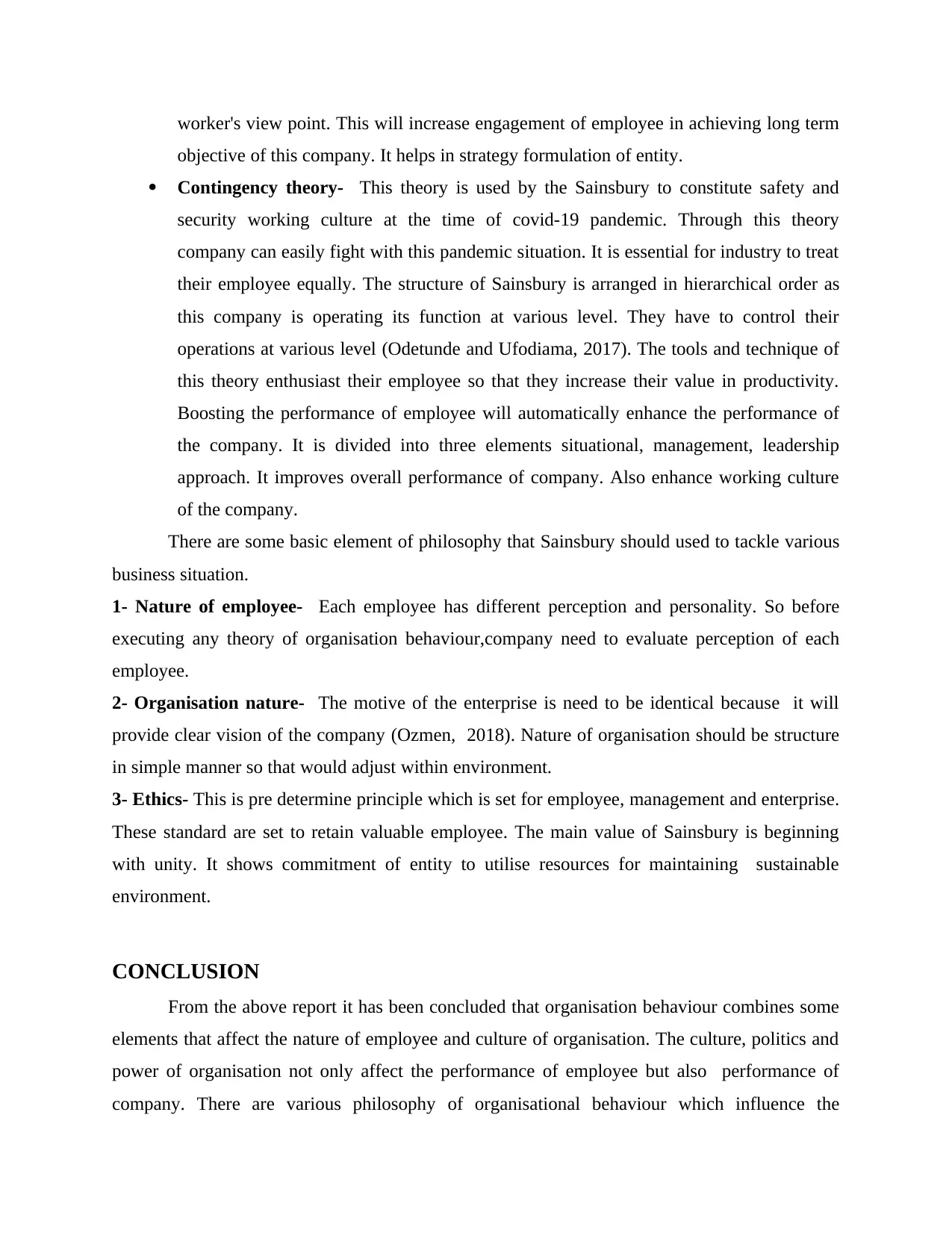
worker's view point. This will increase engagement of employee in achieving long term
objective of this company. It helps in strategy formulation of entity.
Contingency theory- This theory is used by the Sainsbury to constitute safety and
security working culture at the time of covid-19 pandemic. Through this theory
company can easily fight with this pandemic situation. It is essential for industry to treat
their employee equally. The structure of Sainsbury is arranged in hierarchical order as
this company is operating its function at various level. They have to control their
operations at various level (Odetunde and Ufodiama, 2017). The tools and technique of
this theory enthusiast their employee so that they increase their value in productivity.
Boosting the performance of employee will automatically enhance the performance of
the company. It is divided into three elements situational, management, leadership
approach. It improves overall performance of company. Also enhance working culture
of the company.
There are some basic element of philosophy that Sainsbury should used to tackle various
business situation.
1- Nature of employee- Each employee has different perception and personality. So before
executing any theory of organisation behaviour,company need to evaluate perception of each
employee.
2- Organisation nature- The motive of the enterprise is need to be identical because it will
provide clear vision of the company (Ozmen, 2018). Nature of organisation should be structure
in simple manner so that would adjust within environment.
3- Ethics- This is pre determine principle which is set for employee, management and enterprise.
These standard are set to retain valuable employee. The main value of Sainsbury is beginning
with unity. It shows commitment of entity to utilise resources for maintaining sustainable
environment.
CONCLUSION
From the above report it has been concluded that organisation behaviour combines some
elements that affect the nature of employee and culture of organisation. The culture, politics and
power of organisation not only affect the performance of employee but also performance of
company. There are various philosophy of organisational behaviour which influence the
objective of this company. It helps in strategy formulation of entity.
Contingency theory- This theory is used by the Sainsbury to constitute safety and
security working culture at the time of covid-19 pandemic. Through this theory
company can easily fight with this pandemic situation. It is essential for industry to treat
their employee equally. The structure of Sainsbury is arranged in hierarchical order as
this company is operating its function at various level. They have to control their
operations at various level (Odetunde and Ufodiama, 2017). The tools and technique of
this theory enthusiast their employee so that they increase their value in productivity.
Boosting the performance of employee will automatically enhance the performance of
the company. It is divided into three elements situational, management, leadership
approach. It improves overall performance of company. Also enhance working culture
of the company.
There are some basic element of philosophy that Sainsbury should used to tackle various
business situation.
1- Nature of employee- Each employee has different perception and personality. So before
executing any theory of organisation behaviour,company need to evaluate perception of each
employee.
2- Organisation nature- The motive of the enterprise is need to be identical because it will
provide clear vision of the company (Ozmen, 2018). Nature of organisation should be structure
in simple manner so that would adjust within environment.
3- Ethics- This is pre determine principle which is set for employee, management and enterprise.
These standard are set to retain valuable employee. The main value of Sainsbury is beginning
with unity. It shows commitment of entity to utilise resources for maintaining sustainable
environment.
CONCLUSION
From the above report it has been concluded that organisation behaviour combines some
elements that affect the nature of employee and culture of organisation. The culture, politics and
power of organisation not only affect the performance of employee but also performance of
company. There are various philosophy of organisational behaviour which influence the
⊘ This is a preview!⊘
Do you want full access?
Subscribe today to unlock all pages.

Trusted by 1+ million students worldwide
1 out of 15
Related Documents
Your All-in-One AI-Powered Toolkit for Academic Success.
+13062052269
info@desklib.com
Available 24*7 on WhatsApp / Email
![[object Object]](/_next/static/media/star-bottom.7253800d.svg)
Unlock your academic potential
Copyright © 2020–2026 A2Z Services. All Rights Reserved. Developed and managed by ZUCOL.




